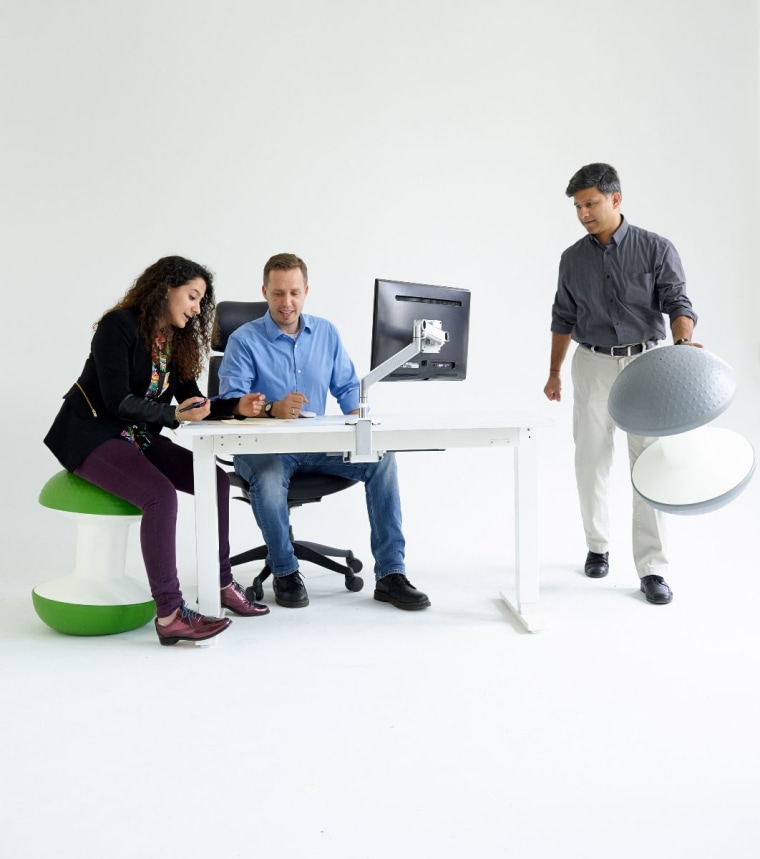If you're reading this article at your desk and you're sitting, get up!
It is one of the best things you can do for your health. If you don't want to stand, then do something active while you're sitting. Millions of workers are choosing to do both, thanks to a slew of new office products that are gaining traction — and dollars — fast.
"This is no longer just a one off, it's a product category," said Thompson Research Group's Kathryn Thompson, an analyst who covers the office furniture industry. "Fitness equipment is a critical part of the new office, and it's really a critical part of the office of the future."
The "healthy office segment" is the fastest growing sub-sector of the $10 billion office furniture industry, and Thompson estimates it could grow to one-third of the industry in the next three to five years. Workers and employers alike are demanding it.
"Good health makes good economic sense," Thompson said.
Read More from CNBC: Boutique Fitness Muscles in on Prime Real Estate
Attention to workplace fitness really ramped up in just the last few years, after the Mayo Clinic published a study on the detrimental effects of sitting for long periods of time. Mayo's Dr. James Levine is credited with coining the term "sitting is the new smoking." He is also inventor of a treadmill desk.
"Any extended sitting — such as behind a desk at work or behind the wheel — can be harmful," Levine wrote in an article on the clinic's website. "What's more, spending a few hours a week at the gym or otherwise engaged in moderate or vigorous activity doesn't seem to significantly offset the risk."
Other researchers have linked sedentary behavior to increases in the risks of certain cancers, cardiovascular disease, type 2 diabetes, obesity, muscle degeneration and even death.
"All of us want to bring down health care costs. All CEOs are out there looking to retain or recruit great employees. Active office, sit-stand desks, are all part of that solution that's happening out there," said Jason McCann, CEO of Varidesk, a Texas-based company that manufactures adjustable desks and other fitness-related office products.
The company is barely three years old, but McCann said it has sold thousands of its products in more than a hundred countries to both individuals and corporations. Varidesk sells over 25 fitness and health-related office products and now employs more than 100 people.
"It started as individuals buying it [the adjustable standing desk], they were taking it to work, and now we're seeing Fortune 500 companies; in fact we're at 75 percent of the Fortune 500 companies today," added McCann.
Varidesk is not alone. It competes with larger private companies like HumanScale, founded in 1983, which bills itself as the pioneer in "office ergonomics." Bigger players in the office furniture space, like Herman Miller, with its "Thrive Ergonomic Portfolio," offer options to the traditional seated desk. Standing desks are becoming standard furniture.
Read More from CNBC: Fitness Tech Could Be Hurting Your Progress
"Steelcase introduced its first one in 2004, and sales for that particular product has grown five fold since then," said Thompson.
Others are taking office fitness a step further. Literally.
"When we started working full-time jobs, we realized that our activity levels considerably dropped, and we were sitting and we were stuck at our desks and we couldn't find accessible solutions out there that let us get exercise in a discreet and a very easy way," said Shivani Jain.
So she and her friend from the University of Chicago, Arnav Dalmia, both now 24, invented Cubii, a digitally connected under-desk elliptical. Users can track their progress on a mobile app.
"People are increasingly aware about their health, their health metrics, and now they have a way that they can really get some exercise," said Jain. It's right there under you. It keeps you honest, the part that is connected to the mobile app, keeps you in check so you know what you're burning and you know what your activity levels are.
They first funded Cubii on Kickstarter, raising $300,000 and selling 3000 units. They just closed their second round of funding, raising $650,000. They say they expect to sell 15,000 units this year.
Read More from CNBC: How a Health Nut Created the World's Biggest Fitness Trend
"Right now our plan is to really scale Cubii because we see an immense potential in the market, and right now we are still a young company," said Dalmia.
Cubii, said Dalmia, is most popular among workers between the ages of 40 and 60. They are using it not only at work, but also bringing it home to use while watching television or doing other sedentary activities.
There is clearly big money and big money potential in a market that focuses on getting people to move at work: Standing and treadmill desks, inflatable ball chairs, ergonomic keyboards, bicycle desks, desk elliptical. The possibilities are as wide as the imagination.
Employees today are working longer hours and working later in life. Young professionals today are more health conscious and more active than any other generation. The old desk and chair model simply doesn't sit well anymore.

